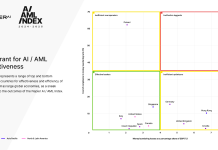The UK is failing to get to grips with anti-money laundering efforts due to the ‘onerous compliance burden’ according to the UK Law Commission.
The government body said that the country’s anti-money laundering efforts should be more focused on most suspicious activity and wants to see fewer, better quality suspicious activity reports (SAR) on the most serious instances of money laundering.
According to the Commission the problem is widespread with between 0.7 and 1.28% of annual European Union GDP connected to ‘suspect financial activity. Under the Proceeds of Crime Act 2002 banks are tasked with reporting money laundering and terrorism financing through Suspicious activity reports (SARs).
When a SAR is issued, transactions are put on hold to allow suspicious activity to be investigated. It is then analysed by the UK Financial Investigation Unit based in the National Crime Agency and any relevant law enforcement agency who may propose taking civil or criminal proceedings.
The UKFIU will then decide whether or not allow the bank to make the transaction which made them suspicious. However, Law Commissioner Professor David Ormerod QC said the ‘reporting scheme isn’t working as well as it should’.
“The law requires banks and others to report suspicious financial activity to help fight against money laundering. This provides law enforcement with the means to investigate and protects honest businesses from inadvertently committing a crime. Enforcement agencies are struggling with a significant number of low-quality reports and criminals could be slipping through the net.”
The UK law commission highlighted a number of issues with the current system. It said the number of ‘low quality SARs’ are making investigations difficult, with the National Crime Agency receiving 27,471 suspicious activity reports between October 2015 and March 2017.
The commission suggested there is ‘an onerous compliance burden’ on the regulated sector, with UK banks spending at least £5bn annually on core financial crime compliance, including enhanced systems and controls and recruitment of staff.
In response, the independent Law Commission has made a number of proposals including statutory guidance on what to look for and a set format for submitting suspicious activity reports, and asking whether new tools could help enforcement like US-style Geographic Targeting Orders.
The commission has also called for additional detail and record keeping requirements, cutting back on low quality reports by focusing on accounts where there are reasonable grounds to suspect property is criminal property, legal protection for banks, among others.
“We’re determined to make the law work for everyone and find a balance which will tackle money laundering more effectively and help keep the UK at the centre of the financial world,” Ormerod added.
Copyright © 2018 RegTech Analyst
Copyright © 2018 RegTech Analyst






